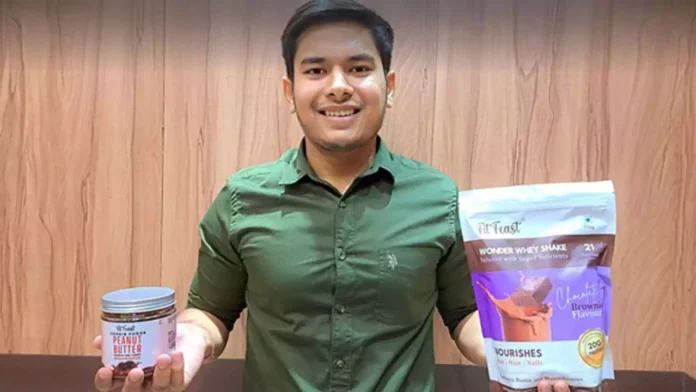FitFeast, a burgeoning D2C brand in the health and wellness sector, is ambitiously targeting a monthly revenue of INR 70-80 lakh by mid-next year. This significant milestone is part of Founder Aditya Poddar’s vision to revolutionize the protein snack market in India.
2-year-old company offers a diverse product range, including peanut butter, protein bars, protein shakes, and protein chips. The brand’s best-seller, peanut butter, features unique flavors like white chocolate and mango.

“By December of this year, we aim to achieve a minimum monthly net revenue of INR 30 lakh, which will put us at an annual run rate (ARR) of around INR 3.6 to INR 4 crore. By mid-next year, around June or July, we aim to hit at least INR 70-80 lakh in monthly revenue, which will give us an ARR of around INR 10 crore. We believe our current channels—D2C, marketplaces, and quick commerce—are sufficient to reach this target,” he shares.
To achieve these milestones, Aditya’s strategy is to remain budget positive, manage the expenditures, maintain profitability at the EBITDA level, and to avoid excessive burn rates.
Currently, 95% of FitFeast’s sales are online, with a significant portion from their own website. While in any given month, the brand is seeing around 35% revenue from the repeat customers, with an average ticket size of INR 900.
“We have really been able to crack D2C, with a return on ad spend around 4.5 to 5 on a blended level,” Aditya notes. The company plans to expand its marketplace presence and explore quick commerce platforms to drive further growth.
Journey and Passion
Talking about his startup journey, Aditya says it was his personal weight loss experience, where he identified a crucial gap in the market. “I was very passionate about the whole health and wellness ecosystem. While on my weight loss journey, I realized there’s a dearth of tasty and quality protein snacks,” Aditya shares.
This insight led to the creation of FitFeast in 2021, aiming to make protein snacks mainstream and not just for gym-goers.
“The idea is to strike the perfect balance between a very healthy spread and a very tasty spread,” Aditya explains. His offerings- protein bars, shakes, and chips continue this theme, offering innovative flavors and high protein content.

The brand’s key markets include metros like Mumbai, Chennai, Bangalore, Kolkata, and Delhi, with plans to penetrate tier 2 and tier 3 cities and explore export opportunities.
Continue Exploring: Nuts & snack brand Farmley set for festive season 2024; aims 2X revenue in next 6 months
Execution and Customer Focus
FitFeast’s success is rooted in its execution and customer-centric approach. “We have done over a quarter and a half in revenue while being profitable, thanks to our execution skills and vigilance in listening to our customers,” Aditya states. The company leverages direct-to-consumer (D2C) sales to get real-time feedback and iterate on their products.
Differentiation and Competition
Meanwhile, being in a competitive market, FitFeast distinguishes itself through taste and innovation. “We want to be at the forefront of bringing exciting flavors and good taste into these categories,” Aditya emphasizes. By making protein more mainstream and less intimidating, FitFeast appeals to a wider audience, from kids to corporate professionals.
Roadmap Ahead
Looking ahead, FitFeast focuses on their popular products—white chocolate peanut butter and protein shakes. “We want to give customers a variety of flavors to choose from and make high-protein items a staple in their diet,” Aditya says.
Over the next six months, the brand has strategic plans to expand its e-commerce presence. These include increasing its visibility on marketplaces like Amazon and Flipkart, scaling up the direct-to-consumer (D2C) channel, and partnering with reliable logistics providers to enhance delivery efficiency, and to start quick-commerce, through Zepto, Blinkit.
“These platforms are perfect for our products because they encourage repeat purchases, which is a big opportunity for us. After scaling on these channels, we’ll take a few weeks to refine our strategy and improve our overall branding and packaging. This will set the stage for significant scaling efforts starting next month,” he says.





